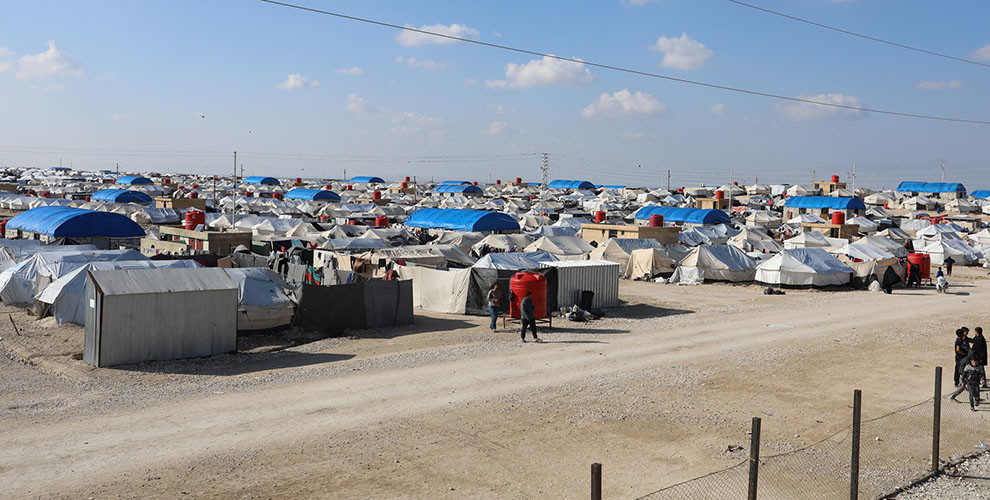Human Rights Association warns of emergency situation in Hol Camp
At the time of the visit, the Human Rights Delegation found 38,000 refugees, mainly from Iraq (13,429), Syria (14,185) and foreign countries (1,124).
At the time of the visit, the Human Rights Delegation found 38,000 refugees, mainly from Iraq (13,429), Syria (14,185) and foreign countries (1,124).

The Human Rights Association in Jazira has released a report about its last visit to Hol Camp.
Although the visit was carried out on 11 February and since then more refugees have arrived at the camp, the report issued by the Human Rights Association is useful because it provides an insight on the composition of the camp population on one hand and the main problems faced by the administration of the camp.
At the time of the visit, the Human Rights Delegation found 38,000 refugees, mainly from Iraq (13,429), Syria (14,185) and foreign countries (1,124).
The newly displaced refugees were from the Hajin areas recently liberated by Syrian Democratic Forces, 28,748 people.
At the time of the visit 3,000 families were still without a place in the camp. Which highlights the first of the problem. As the Human Rights delegation pointed out “the camp is not even stretched to the limit, it has well passed those limits as it is now housing 4 times more refugees that its capacity would allow. Yet - added the delegation - the camp management is doing all they can to ensure everyone is attended properly”.
The main problem for these refugees and the camp management is that in fact, apart from the Jazira Autonomous Administration, very little help and assistance are provided from other agencies within and outside the country.
“For example - said the Human Rights delegation - heating is a huge problem, as overcrowding means also shortage of heaters. Thus, 4,000 families are without proper heating. The other issue is water. For the same reason, overcrowding means less water per capita. At the time of our visit, the administration was able to provide 15 litres of water per person a day.”
Another problem is the shortage of tents on one hand and the bad conditions of most tents on the other. Thus, 3,000 are without tent and some tents house up to five families. Most tents are 8 years old or older, and this means they have worn out and almost unfit to house families.
Food is provided but again the administration of the camp cannot cope with the demands of the refugees and has called for help.
As to the composition of the refugees, the Human Rights delegation confirmed that there are many women and children related to DAESH mercenaries, i.e. wives and their kids. Many are foreign nationals, Morocco, Belgium, Afghanistan, Dagestan, India.
The delegation spoke to Aisha Amir Bek from Dagestan. She is married to Takh Mirza, also from Dagestan, and has two children, one 3 years old and the other just 3 months old. Her husband was killed and she was rescued by the SDF. She complains from lack of milk (something the Camp administration also has underlined) and said she wants to return to Dagestan.
Another woman, Nadia Baguri, is from Belgium. She studied at the university and she is a nurse. She came to Syria with her husband, Muhammad Mazroui/, six years ago. She has 4 children who are 6, 5, 3 and 2 (the latter suffers from epilepsy and need treatment and medicine). The family came from Abo Badran and surrendered to the Syria Democratic Forces.
Zamira is from Russia. She married twice. Her first husband was killed and she doesn’t know what has happened to her second husband. She has three children and came to the camp from the area of Abo Badran.
As well as the practical and material difficulties, there are also problems as to how to deal with DAESH mercenaries and their families in the camp. Many of these refugees, said the Camp administrators, still support DAESH and adhere to its rules and ‘principles’ therefore for example they do not accept cooperation from the Camp administration and said that they are ready to implement whatever orders they may receive from the organisation. There are huge problems with children as well, as they have been receiving military training and have been fed with extremist ideas. These children, said the Human Rights delegation, are in urgent need of rehabilitation that would facilitate their integration into society again without posing a threat to others.